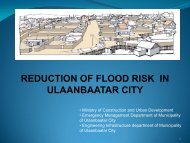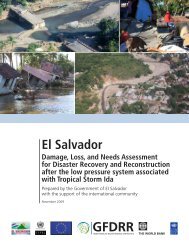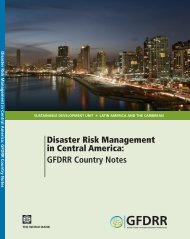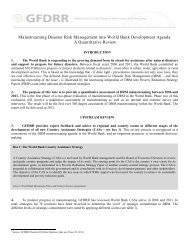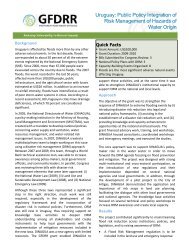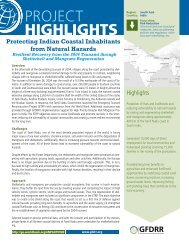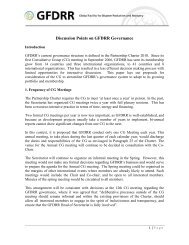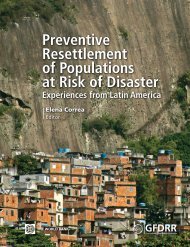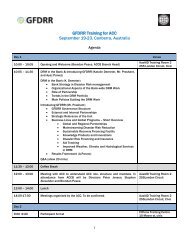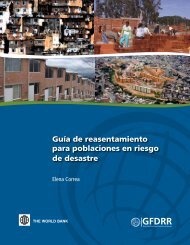Haiti Earthquake Reconstruction Knowledge Notes from ... - GFDRR
Haiti Earthquake Reconstruction Knowledge Notes from ... - GFDRR
Haiti Earthquake Reconstruction Knowledge Notes from ... - GFDRR
You also want an ePaper? Increase the reach of your titles
YUMPU automatically turns print PDFs into web optimized ePapers that Google loves.
6 | <strong>Haiti</strong> <strong>Earthquake</strong> <strong>Reconstruction</strong><br />
Managing Post-Disaster Aid<br />
The <strong>Haiti</strong> <strong>Earthquake</strong> will be remembered as one of the most tragic natural disasters in recent times<br />
and also as one of the largest relief and recovery efforts ever. The international community has an<br />
opportunity to help <strong>Haiti</strong> and demonstrate that it has learned the lessons of previous large-scale<br />
natural disasters, especially <strong>from</strong> post-Tsunami. Given the outpouring of global solidarity it is most<br />
likely that there will be enough resources to rebuild <strong>Haiti</strong>. However, the success or failure of <strong>Haiti</strong>’s<br />
reconstruction will depend on the management and implementation of these resources.<br />
Key Decision Points<br />
1. Establish early the best mechanism to<br />
manage the recovery. Clear modalities of<br />
operation will be critical.<br />
2. Speed should override detailed planning<br />
in the early phase. A “cluster<br />
approach” can help establish clarity on<br />
leadership.<br />
3. Hold (monthly) decision meetings with<br />
international partners and conserve the<br />
time of senior government officials.<br />
4. Tracking the money and results needs<br />
to be started early. A strong and detailed<br />
Damage and Loss Assessment is critical to<br />
effectively allocate resources later.<br />
5. Establishment of a Multi Donor Trust<br />
Fund can help reduce fragmentation of<br />
aid.<br />
6. Allow for flexible PFM arrangements.<br />
Projects do not need to be channeled<br />
through country systems if the regular<br />
budget cycle makes efficient implementation<br />
difficult.<br />
<strong>Haiti</strong> will be the most important test of the international<br />
community’s ability to coordinate<br />
aid effectively since the post tsunami reconstruction.<br />
<strong>Haiti</strong> has been receiving a huge inflow<br />
of resources and this increasing volume of aid will<br />
come with increasing fragmentation. Aid coordination<br />
will thus be one of the most important challenges,<br />
both in the short term for the relief effort<br />
as well as in the medium term when the reconstruction<br />
effort begins.<br />
The strength of <strong>Haiti</strong>’s and international management<br />
system will determine the success of<br />
the recovery effort. <strong>Haiti</strong>’s senior government officials<br />
will most likely be overwhelmed by requests<br />
<strong>from</strong> well-intentioned donor partners. It is important<br />
that development partners and<br />
NGOs do not overestimate their individual role.<br />
Too frequent individual interaction with senior<br />
government officials creates a high risk of draining<br />
unnecessarily the scarce human resources of<br />
<strong>Haiti</strong>’s government. A recent survey of humanitarian<br />
assistance considered the lack of effective and<br />
efficient coordination as the biggest constraint to<br />
a successful response to humanitarian operations<br />
(see figure 1).



